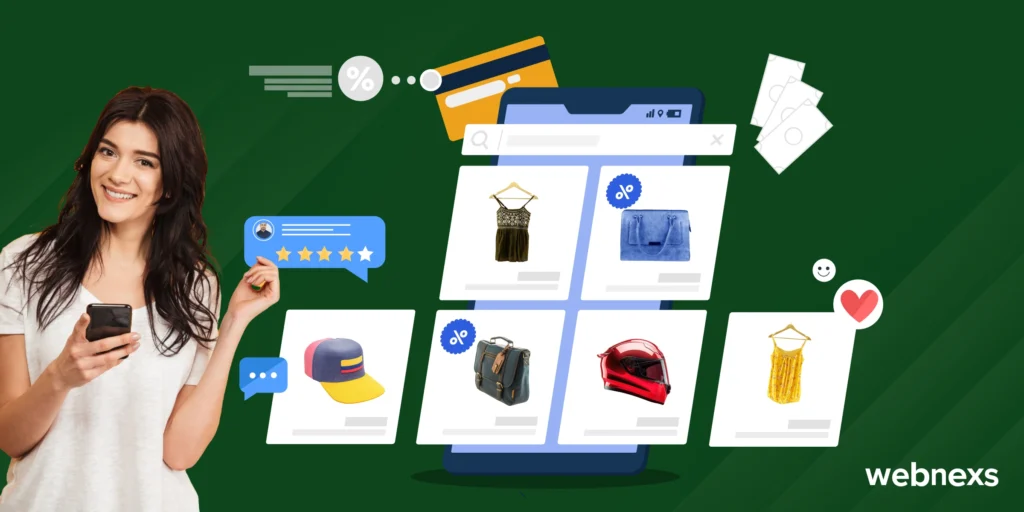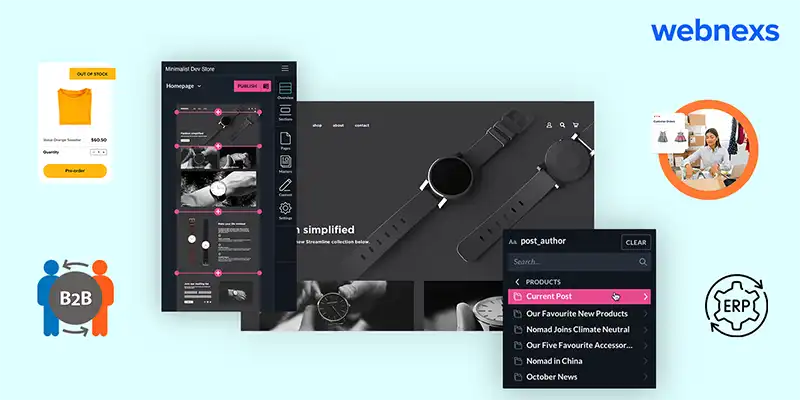Before moving on to the best B2B Headless commerce strategies for your business growth , I’d like to share some information on what headless commerce is here.
Headless commerce is the latest trend in the ecommerce business. It involves separating an ecommerce platform’s front end from the backend. This means the platform’s customer user interface is separated from the server-side portion.
This platform helps businesses deliver a personalized user experience to their customers with the additional feature of an efficient backend for managing orders, inventory, and customer data.
Businesses that have implemented headless commerce strategy will notice an increase in flexibility compared to monolithic architecture.
Will also achieve a 25-30% increase in conversion rates within two years. This can be highly beneficial for businesses that sell customizable products and services.
B2B headless commerce provides better integration capabilities with third-party systems and services, such as CRM or ERP platforms.
This can help simplify business operations and reduce the manual work of syncing data between applications, increasing customer satisfaction, loyalty, and revenue for B2B businesses.
Now, let’s begin with why you need a headless commerce strategy and can look into the various B2B headless commerce strategies to grow your business in this blog.
Key Takeaways On B2B Headless Commerce
- B2B headless commerce strategy offers flexibility with the separation of front end and back end systems to improve user experience.
- Scalability in headless commerce B2B models make expansion much easier. It allows businesses to grow and adapt quickly to market changes without any interruption.
- An omnichannel strategy and real-time data analytics boosts customer engagement, decision-making, and risk management in B2B headless commerce.
- API integration provides seamless communication across platforms. Headless b2b ecommerce strategy also supports faster market adaptation.
- Targeted marketing, SEO, mobile optimization, and continuous improvement to drive traffic, increase conversions, and ensure long-term competitiveness with B2B headless commerce strategies.
Why You Should Implement a B2B Headless Commerce Strategy for Your Business?
Headless commerce allows the business to make front-end customization without relying on the backend. This advantage of headless commerce makes businesses more flexible in providing customized offerings to meet their specific customer needs.
Some of the key advantages you need to take into consideration are…
- Seamless Omnichannel Experience
- Faster and More Flexible Customization
- Enhanced Performance and Speed
- Scalability for Growing Business Needs
- Future-Proofing Your Ecommerce Solution
Businesses get a very good improvement in engagement and customer retention. Because they provide a smooth and easy-to-use experience across all channels.
Headless commerce strategy helps to speed up the development process on new functionalities and features. So that you can shift to market changes and customer demands immediately.
This strategy is designed to manage the increase in traffic and high-volume transactions. It makes sure that headless solutions too grow as you expand.
Major advantage of implementing this strategy is that it can easily merge with existing ERP and CRM. It helps businesses to get a clear view of data and improves decision-making.
What Are The Best B2B Headless Commerce Strategies For Your Business Growth?

To create a strategy that can fulfill all the needs of the users is very tough. But with us you can make it very easy.
With a lot of changes in today’s technologies on a daily basis and various regional demands, businesses are struggling to find strategies that work for them effectively.
But here it is not going to be the same for you, you can get all the strategies that can work effectively for your b2b headless commerce software.
Adopt these strategies not only to save time and resources but also to create channels and build relationships with your customers via every possible endpoint or application.
Below is the list of 9 best b2b headless commerce strategies for your business growth:
- Increase Product Offering Per Region
- Boost Marketing Efforts
- Invest in Technology
- Focus on Scalability
- Build as many APIs as the business needs
- Go Omnichannel
- Use Any Data Analytics engine
- Go Agile while developing new modules
- Engage in Continuous development & Improvement
Now let’s get into the strategies to boost your sales, and customer loyalty by implementing it in your ecommerce software.
1. Increase Product Offering Per Region
Businesses that localize their product offerings with headless commerce through region-specific strategies have seen up to a 30% increase in sales
Add new products or services that can complement your current offerings to target specific regions. It will help you in attracting new customers and growing your business.
Start with a thorough market research of what are the needs of a specific region and then customize your product results to the regional preferences with the research data you got.
Connect with the local businesses to make the process even easier and use targeted campaigns to promote new offerings.
Continuously get customer feedback and look at whatever optimization you can make for future expansion, as well as to add new products.
Actionable Insight:
Analyze the local market trends and customer preferences to meet regional trends. According to your preferences, customize your product catalog. Use headless commerce to adjust offerings based on geographic data.
Real-Life Example:
McDonald’s customizes its menu based on regional tastes. In India, where a large portion of the population is vegetarian, they offer the McAloo Tikki Burger and Paneer Wraps. In Japan, they introduced the Teriyaki Burger, catering to local flavors. By continuously analyzing regional preferences and optimizing its menu, McDonald’s maintains strong global sales.
2. Boost Marketing Efforts
63% of marketers report that social media drives the highest return on investment (ROI) among marketing channels.
Primary goal of b2b marketing is to reach new customers and increase brand visibility. As said earlier, focusing on targeted campaigns will give you a better ROI.
Research and collect data for the specific regions, so that you can easily shape your marketing tactics to meet audiences.
Enter into new channels like WhatsApp, Facebook, Instagram, Business WhatsApp, and Emailers to maximize your reach. Never ever forget to alter your marketing strategies, if it doesn’t work.
Actionable Insight:
Use headless commerce to create personalized marketing campaigns that are just right for your customers. By using APIs, you can connect with smart marketing tools to send promotions to the right people on different platforms.
Real-Life Example:
Spotify uses headless commerce to personalize its marketing and user experience. By integrating AI-driven marketing tools, it creates region-specific playlists like “Top Hits America” or “Latino Heat” to attract more listeners. This personalized approach has significantly boosted engagement and premium subscriptions.
3. Invest in Technology
89% of businesses that used a digital transformation strategy said they made more profit.
It is a super fast technology-changing era. If a business doesn’t change its technology according to the modern world and user needs, it fails in its business field quickly.
Always invest in new technologies like headless commerce for b2b to stay ahead of the competition. It will always make you one step forward from your competitor.
With the use of advanced technologies, and the latest ecommerce tools you can improve your site’s performance and also meet the needs of your customers.
Actionable Insight:
Adopt modern technologies such as Progressive Web Apps (PWAs) and Single Page Applications (SPAs) to enhance user experience. Ensure your development team is proficient in these technologies to fully leverage headless commerce capabilities.
Real-Life Example:
Nike adopted a headless commerce model to enhance its online shopping experience. By using Progressive Web Apps (PWAs), they improved speed and personalization, offering seamless interactions across devices. This move helped them drive higher engagement and increase conversion rates.
4. Focus on Scalability
Businesses that prioritize scalability in their ecommerce platforms see a 20-30% reduction in operational costs
We can see a common flaw in most of the rapidly growing businesses is scalability. When you cannot easily expand your business operations like your business expands you are failing.
So always make sure whenever you move to the next step you are highly scalable to avoid disruptions and incomplete transactions.
This kind of approach not only supports your growth but also positions your business for long-term success.
Actionable Insight:
Make your headless architecture strong enough to handle more people and orders without any problems. Use cloud-based solutions and microservices to make sure your system can grow easily as your business gets bigger.
Real Life Example:
Red Bull, which is an energy drinks brand that had implemented headless commerce for b2b to handle large-scale orders to distribute to channels and global markets. They needed a backend system to support high-volume purchases to integrate with multiple ERP systems.
5. Build as many APIs as the business needs
50% of B2B businesses plan to adopt headless commerce within the next 12 months, emphasizing the need for robust API integrations.
Create an advanced set of APIs, it is essential to meet the needs of your business. APIs are the only thing that allows different systems to communicate effortlessly.
Activate a smooth integration across platforms to get better results. The creation of APIs for your specific business needs helps to enhance your business processes.
This approach not only improves innovation, it makes you quickly adapt to the changing market demands.
Actionable Insight:
Create custom APIs to easily connect your headless commerce platform with other business systems like ERP, CRM, and third-party services. This integration will help all your systems work together smoothly, improving efficiency and data flow.
Real Life Example
Schneider Electric used headless commerce for b2b to connect its sales systems, CRMs, and partner dashboards through APIs. Integrated it to create an efficient ordering workflow for their B2B clients.
6. Go Omnichannel
Omnichannel shoppers spend 4% more in-store and 10% more online than single-channel shoppers.
Omnichannel strategy is one of the best strategies in headless commerce, where it provides a smooth experience to the users across all touchpoints or channels.
It helps the customers enter into your businesses through various channels like online, in-store, mobile, etc… This strategy boosts the engagement of the customers.
With a little alteration in your omnichannel strategy, you can meet consumer expectations easily and stay one step ahead of your competitors.
Actionable Insight:
Make sure customers have the same great experience everywhere by using headless commerce to manage content and transactions in the same way on all channels.
Real Life Example:
CCEP implemented a headless commerce for b2b to unify their online shopping, mobile platforms, and in-store systems. So that distributors can place orders effortlessly across any device or platform.
7. Use Any Data Analytics engine
Companies that use predictive analytics reduce operational risks by 20-30%
Use data to create a strategy because when you create a strategy on this basis, you will make accurate choices instead of guesses.
It leads to better planning and a better understanding of the customer’s needs. Data also allows businesses to spot the risks earlier and not to get trapped.
Overall, this strategy boosts profits, encourages teamwork, and supports it by using real-time data.
Actionable Insight:
Integrate your headless commerce platform with advanced analytics tools to gain insights into customer behavior, sales trends, and operational efficiency.
Real-Life Example:
Sephora uses data analytics to personalize its customer shopping experience. By tracking online and offline purchases, they provide tailored product recommendations via email and their app. Their Color IQ technology even uses customer data to match the perfect foundation shade, enhancing user engagement and boosting sales.
8. Go Agile while developing new modules
80% of companies that do not currently use headless architecture intend to do so within the next two years, indicating a shift towards agile and flexible systems.
An agile approach for new modules makes the process more responsive. With this, teams can make changes quickly based on feedback and shifting needs.
Focus on small steps and teamwork to deliver new features faster and make sure they meet user expectations.
This technique helps to make the development process much easier and gives a better final product.
Actionable Insight:
Adopt agile methodologies in your development process to rapidly deploy new features and respond to market changes. Utilize the decoupled nature of headless commerce to update front-end experiences without backend disruptions.
Real-Life Example:
Tesla follows an agile development model, allowing it to release software updates rapidly. Their Over-the-Air (OTA) updates enable them to enhance vehicle features and fix issues remotely, without requiring customers to visit a service center. This agility has set them apart in the automotive industry.
9. Engage in Continuous development & Improvement
Businesses that invest in continuous development see 20% higher revenue growth
Stay updated and be aware of the latest trends in your business field. Ensure that your products and processes are up-to-date.
Regularly updating your features and doing continuous improvement, leads you to stay top in the market. It makes the market follow you.
The main motive for implementing these strategies is to stay innovative and provide value to the customers according to their needs. This strategy will help you in doing this.
Focus on continuous improvement and development to stay ahead of your competitors.
Actionable Insight:
Regularly update and optimize your headless commerce platform based on user feedback and performance metrics. Implement A/B testing to identify effective strategies and areas for improvement.
Real Life Example:
GE made a step towards a modular headless commerce for b2b to make their commerce platforms flexible to future technologies. So that their B2B clients benefit from innovative solutions.
Boost Growth with B2B Headless Commerce Strategies – Start Now!
How Can a B2B Headless Commerce Strategy Help Brands Grow?

Use B2B headless commerce strategy for several reasons. Because this kind of approach gives you a lot of benefits to fulfill your unique B2B business needs.
It helps brands to grow with freedom of customization, improves user experiences without compromise due to the restriction placed by technologies, and provides a consistent shopping experience across all channels. So that they can easily adapt to changing needs and provide real-time data to help make better decisions.
These strategies help you to enter into global markets with ease without breaking any old features, fasten product launches, and also increase customer engagements. It leads to better returns on investment.
Overall, these strategies help brands become more competitive and operate more efficiently in a fast-changing market.
Key Requirements for Implementing a Successful B2B Headless Commerce Strategy

Check the strengths and weaknesses of your current ecommerce platform. Perform a SWOT analysis This test will help you to know how a headless commerce strategy helps you to improve your business.
By SWOT, we mean
- S = Strength
- W = Weakness
- O = Opportunities
- T = Threats
When you can analyze and write 5 points to each of S W O T, you gain visibility over the areas you need to strengthen and ride on the areas where you are strong already, without any kind of guesswork.
APIs are the core feature of headless commerce for b2b. So shift or design all your business activities to adapt to the API integration. It allows you to easily connect your frontend with different backend systems, actually a lot of them with a variety of features, without any obstacle.
Select a content management system that provides unlimited flexibility and scalability. With a headless cms, you can manage and update the content in the front end. It gives you greater control over where your content needs to be displayed.
Skilled developers or a dedicated development team are required to go through the complications you are facing in a headless commerce strategy.
73% of businesses that regularly conduct SWOT analysis say their strategies align better with market needs
How to Overcome Common Headless B2B Ecommerce Challenges Using These Strategies

These are the common challenges faced by the b2b businesses while implementing a headless commerce strategy. Many don’t give you the solution for the challenges, but you can access the solution too here….
1. Increased Cost and Complexity
Instant switch to headless b2b can higher your initial costs and can be complicated because of the need for multiple technologies and integrations.
It can be solved by doing a cost-benefit analysis to know the long-term value versus the initial investment. This could be feeling a bit grinding, but in the long run, this will prove to be an investment made with wise thoughts!
2. Need for a Larger Development Team
Headless b2b ecommerce includes a lot of technologies. You’ll need an experienced and larger development team.
To address this, consider partnering with an experienced agency like Webnexs which has an expertise development team in this field as well as 10+ years of experience.
3. Difficulty integrating with other systems
Yes, you can face struggles in connecting different technologies with your current platforms. To overcome this, use advanced API solutions to bring a smooth connection between different systems.
4. Security Maintenance
Common insecurity customers feel in ecommerce platforms is security maintenance. Will the data exchanges be more secure?
To get rid of this, update your software regularly, advanced encryption, thorough protection of sensitive information, and provide a secure environment.
5. Uniform System Management
Headless b2b ecommerce may seem to be complicated because of the use of multiple platforms, channels, and tools. Make it easier by having a centralized management dashboard, that should have consistent control over all your activities.
Top 5 Effective Strategies to Boost B2B Marketing Through Headless Commerce

Here are the top 5 effective strategies for your b2b business to take your marketing efforts to the next level. When marketing a b2b headless commerce site, use the following strategies:
1. Ensure That Your Site Is SEO Friendly
Get more visibility, and reach a wider range of audience with SEO. Use the right keywords, optimize your meta tags, and fast loading times leads improve your rankings in SERPs and invite more potential customers.
2. Drive Traffic To Your Internet Site Using Social Media
You can get more traffic from social media. A powerful tool of marketing to meet the audience. Here, you can share engaging content, and industry insights, and can turn the audiences as traffic to your website.
73% of marketers say their efforts through social media marketing have been very effective in increasing traffic to their websites.
So use social media as a effective tool and drive traffic to your website.
3. Use Targeted Advertising To Reach Your Target Demographic
After you get a very good reach, now get into the target advertisements to make the conversion rates go higher. With the help of campaigns you specifically target a set audience and make them customers.
4. Ensure That Your Website Is Mobile-Friendly
Mobile-friendly websites are essential for all the b2b commerce business modules. Get higher conversion rates and increase engagement with the mobile-friendly website. Optimize your functionality and website design for mobile users.
57% of users won’t recommend a business with a poorly designed mobile site
Make your website well optimized for the mobile users to get higher user engagement.
5. Take Advantage Of Data
Data helps you to know how the customers react and behave on your ecommerce website. With those insights, you can make smart decisions, adjust your marketing strategies, and boost your results.
Conclusion
Headless commerce brings many benefits to B2B businesses, such as greater flexibility, better customer experiences, and easy integration with existing systems.
Using the strategies that have been mentioned in the blog will 10x your income growth. The above-mentioned are the top strategies of every B2B headless commerce business.
These strategies help businesses create personalized experiences and adapt quickly to market changes. Plus, a headless approach will keep you updated, which is more important for meeting changing customer needs.
At last, headless commerce b2b is not just about following trends; it’s about preparing your business for long-term success in today’s digital world.
Focus on these strategies to open up new opportunities and enter a new marketplace that will lead your b2b headless commerce business to a brighter future. Contact us today!






51 Responses
In a platform with a headless architecture, the business logic/functional layer and the content presentation layer are separated from one another.
By utilizing the power of APIs, B2B headless ecommerce enhances the shopping experience for your customers.
Businesses can develop solutions that meet their needs by using a headless commerce architecture, which allows them to go beyond the conventional storefront constraints.
Additionally, the API approach enables them to select best-in-class technologies to build their stack out of products that address their business needs.
By facilitating agility and customizations that lead to individualized shopping experiences, headless commerce is a great way to keep up with the constantly evolving expectations of the customer experience.
A headless B2B ecommerce solution allows you to manage customer-specific pricing, order and cart management, catalog management, and order workflows without interfering with the backend system. Thank you, Webnexs, for the insightful blog. That is wonderful to know.
We would like to start selling anywhere without being constrained by design or development with b2b headless commerce. Could you please get in touch with us or leave your email here?
One of the most popular ideas in today’s culture is headless commerce. Due to the constant changes in consumer expectations, competition, and omnichannel requirements, it has become a potent tool for eCommerce brands and agencies.
We want “headless eCommerce,” which refers to eliminating any code that communicates with a website’s front end. I appreciate you providing this content.
Headless Commerce, unlike traditional eCommerce solutions, allows B2B eCommerce companies to separate the front-end and back-end tiers of their website to improve web performance, scalability, and flexibility .
Will your headless solution provide exceptional customer experiences on the frontend, regardless of the work being done on the backend?
It may not have been the obvious choice for a startup to choose Headless, but a strong foundation is essential when you have a big vision.
Such wonderful and worth reading articles on headless topics as I’m into the e-commerce segment.
Headless eCommerce is the future if your B2B e-commerce company has an omnichannel strategy in place, so choose Webnexs headless solution since I have been a client of theirs for the past 4 years.
You have made great progress in the headless topic that too on the b2b commerce segment, it’s much needed. Are you providing a complete headless solution?
I can tell you did your best! And I have got a doubt, Are there any “on terms” or “purchase order” transactions that require delayed payment that is permitted for particular organizations or user types?
B2B headless ecommerce improves the shopping experience for your clients by leveraging the power of APIs. I appreciate the article; that is wonderful to know.
B2B is investing “all in” in headless content and headless commerce platforms for their online storefronts as a result. What do these expressions mean, though?
This really sparkles! First, we should take a step back and explain what a headless B2B platform actually is. And you did it, thanks.
By establishing pathways to agility and customization that result in personalized purchasing experiences, headless commerce, in my opinion, is a great way to keep up with the continuously changing customer experience expectations.
I discovered from reading another article that 59 percent of B2B respondents in recent research claimed to use headless.
This blog is top-notch! Thus, the infamous headless architecture results from separating the heads from the body. It is known as headless B2B ecommerce for this reason.
But is it really that simple, should you consider this tactic, and, most importantly, does this headless strategy make sense in the context of your B2B vision?
This is magical work! If you’re someone who looking to build your e-commerce with a headless, then go for a built-in CMS system, Webnexs headless solution offers the option to use Headless B2B CMS to build the entire front-end using the tools of your choice.
Older monolithic platforms, as mentioned, advertised a universally applicable solution. This was painful, especially in the parts of the platform that generated revenue and profits, but being headless is not painful.
What a great vision you have in loud writing on headless b2b commerce, keep it up.
Using a headless B2B e-commerce solution, you can manage custom pricing, order and cart management, catalog management, and order workflows without affecting the back-end system.
You make me want to learn more about headless B2B commerce, thanks. How to contact your concern?
By the way, the main reason to replace a B2B portal that isn’t integrated with the ERP is to save money.
The freedom and ease of headless commerce and headless content (CMS) to drive business growth is increasingly important to the B2B model today and into the future. This is the trend, and it is given by the headless.
I’m a digital marketing expert, and a quick look at Google Trends shows that the term “headless commerce” is seeing an increase in search volume this year.
What To Know About B2B Selling’s New Frontier with b2b headless?
While it’s clear how omnichannel B2C storefronts would benefit from this distributed approach, it’s worth noting that more and more B2B eCommerce sellers are also using headless.
The advantage of headless architecture is that it enables businesses to use the business logic in a way that is tailored to their particular needs. That looks real, doesn’t it?
Even if you are running two separate CMS services, one for each store, your CMS will continue to function as usual and will now pull data from the new platform rather than the old. That shouldn’t be the case. Any queries?
Webnexs headless introduces the first headless trading platform and provides an open, decoupled environment for unlimited trading opportunities across all channels.
If you’re unfamiliar with APIs, consider them to be a means of communication between software components. In terms of B2B commerce software, that is a cool point.
In your B2B e-commerce, does headless commerce have a place?
How often does this vendor provide the updates, looking to build one, do let me know?
How much server memory and CPU power is required for a platform to launch?
According to 52% of digital agencies and 46% of retailers that took part in Webscale Networks, Inc. is the little-known 2021 Global Headless Report.
The benefit of headless, API-first e-commerce is that you are free to use any other headless content management system that best suits your requirements.
What advantages do a headless e-commerce platform and a B2B have when they are combined?
Should you invest heavily in new architectures and development methods?
Do all these headless solutions you’re currently offering support that expectation?
Businesses can go beyond the conventional constraints of a storefront and develop solutions that meet their needs by using a headless commerce architecture.
But there is one reason why a company would want to use a headless CMS; in this case, the client is a national floral retailer who relies heavily on website content to inform and motivate their customers.
There is no denying that in order to stay ahead of the competition, businesses must provide excellent shopping experiences at all customer touch points, whether they are B2B or B2C.
Wanna ask you one thing, how large is the ecosystem of the vendor’s add-ons?
Your enterprise business needs to be agile to survive and flourish in the ecommerce market, where scalability, flexibility, and speed are given greater priority.
Could a client modify the platform to remove or add particular functionality?